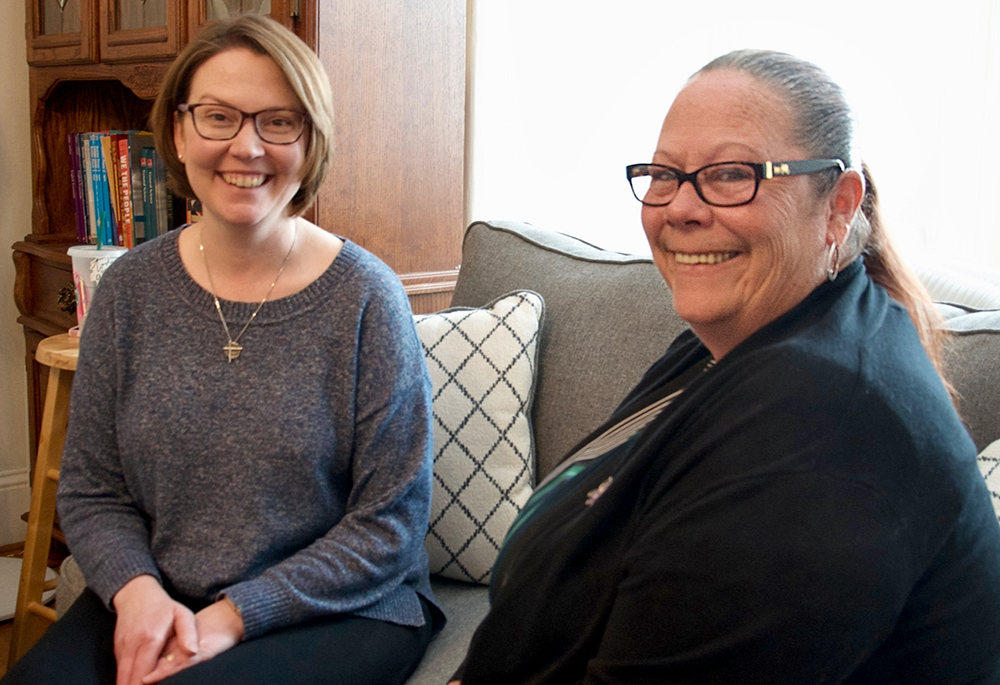
(GSR illustration/Olivia Bardo)
Ann Marie Jones, residential coordinator at Dawn's Place, has a special connection to the women in the long-term residential program for survivors of sex trafficking. She understands their journey in ways no amount of professional training could ever provide.
Because she is a graduate of the program.
In 2011, Jones was freed from the bondage that had held her for 14 years. But just being free doesn't heal the damage that's been done, and it was the program at Dawn's Place that let Jones rebuild her life.
But don't tell her you're sorry she went through those years of hell.
"Don't be sorry," she said. "I went through something like that to be who I am today."
Who she is today is no longer a victim, but a healer, and a professional who developed a 12-step sexual exploitation recovery group.
"Ann Marie never really left here," said Sr. Meaghan Patterson, a Sister of St. Joseph of Philadelphia and executive director of Dawn's Place. "She graduated and five months later they offered her a job."
'It's not just a house'
In 2007, Sr. Teresita Hinnegan, a Medical Mission Sister, and Mary DeFusco, a public defender, decided to expand upon the work of the Philadelphia Anti-Trafficking Coalition, formed three years before, because none of the more than 20 groups in the coalition had a residential program for survivors.
Hinnegan and DeFusco were joined by Grey Nuns of the Sacred Heart Sr. Terry Shields, St. Joseph Sr. Kathleen Coll and public defender Marissa Bluestine, to found Dawn's Place, a nonprofit named in honor of a prostituted woman murdered across the river in Camden, New Jersey. When the Sisters of the Good Shepherd were unable to continue their ministry helping women abuse survivors, they donated the house to Dawn's Place, which opened its doors in 2009. DeFusco is president of the nonprofit's board.
As public defenders, DeFusco and Bluestine saw the system punishing victims as women were arrested and jailed for prostitution over and over again — Jones was arrested 51 times, she said. Jail wasn't getting women out of the trap they were in, and it certainly wasn't healing the damage that had been done.
That makes seemingly little moments in the Dawn's Place program momentous. "When we get here, we say, 'Welcome home,' " Jones said. "It's not just a house, it's not just a program. Something I always wanted my entire life was a home."

St. Joseph Sr. Meaghan Patterson, left, and Ann Marie Jones are seen March 21 at Dawn’s Place in Philadelphia, a long-term residential program for survivors of sex trafficking. Patterson is the nonprofit’s executive director, Jones is the residential coordinator. (GSR photo/Dan Stockman)
Another is when they get the key to their bedroom — having their own, private space is something almost inconceivable after being exploited.
"I was used to moving over a piece of plywood" to get into the abandoned house she lived in, Jones said. So being given a key, "that feeling was indescribable."
One client wept when they celebrated her birthday, saying no one had ever done that for her before.
Patterson said the program is tailored to each woman's needs.
"The specifics depend, but they all have complex trauma," she said. "And it's not just that they were exploited — a lot of times they had childhood sexual abuse, physical abuse, house fires, car accidents, mental health issues, PTSD, anxiety, depression and sometimes physical issues, depending on what drugs were taken and for how long, and how long they went without seeing a doctor."
Patterson said the life expectancy for someone being trafficked is about seven years.
Advertisement
The women in the program have always gotten therapy, but now there is a part-time therapist on staff.
"Sexual trauma therapy is critical — if you don't work on that, you're going to always struggle with jobs, housing and life in general," Patterson said.
The past can haunt survivors, the same way their exploiters can haunt them — Dawn's Place is at an undisclosed location, the mailing address is a P.O. box, and the security system is always on. Patterson said that on occasion an unknown person will show up at the door, but they leave when told they're being recorded. The risk of being found and revictimized is real.
Complex world of trafficking
Most people think of trafficking as children being abducted off the street and put into slavery, Patterson said, and while that does happen it's only one facet of a complex world.
"What we see is many women trafficked or exploited by someone they know," she said. "Or it's somebody that, through the process of love and affection, took them down a path they didn't see themselves going down. While the perception is that women doing sex work choose that."
Jones said traffickers will get women hooked on drugs, then withhold the drugs until they meet certain quotas.
And the only common denominator among victims is that they are, for whatever reason, vulnerable, which the traffickers exploit.
"We have had people with college degrees that were working on their master's degree," Patterson said. "There's no one definition — they can be any race, any background, any education level, any phase of life."
The narrative of victims being abducted by strangers persists, Patterson said, because it is too hard to face the reality that people are being exploited by friends and relatives they trusted.
"We're all horrified when a child is snatched off the street, but no one wants to talk about how do you buy and sell a human being," she said.
And while the perception of sex trafficking is that it takes place in red-light districts or high-crime areas, Patterson said smartphones and cash apps mean the person on the train next to you texting may be getting an assignment or sending money for a sexual transaction, making the crime almost invisible.
And recovery is work that never ends, Jones said.
"For 14 years I've done the work and I still do the work," she said. "We do presentations and I still cry when I tell my story. … I was in a relationship, but wouldn't kiss him and he didn't understand that. Will I ever be able to kiss someone? I don't know."
Patterson said Dawn's Place is a yearlong program, but that is just the very start of the journey survivors are on.
"We're just touching the tip of the iceberg. It's a lifelong process," she said. "Even if they were just trafficked for a short time, it's done critical damage."
Because of that, Patterson said, the organization makes sure to have survivors at every level of decision-making.
"I don't know what [being trafficked] is like and I don't pretend to know," she said.
Since opening, Dawn's Place has had about 140* women graduate from the program.
"People have been buying and selling humans since the beginning of time," Patterson said. "It's about power and it's about money."
*This story has been updated with a correct number of women who graduated from the program provided by the executive director.





